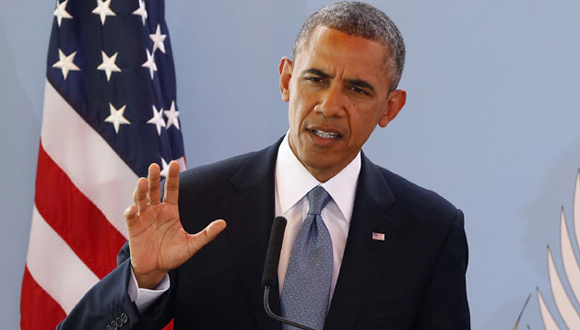US President Barack Obama launched legal action against “unfair” Chinese rice, wheat and corn subsidies at the World Trade Organisation on Tuesday, setting up a culturally sensitive multi-billion-dollar trade spat.
The United States alleges that China doled out $100 billion in “market price support” for the grains, above levels agreed at the Geneva-based WTO.
“When other countries flout the rules to try and undercut American workers and farmers, we hold them accountable,” Obama said in a statement announcing the action.
China is the world’s largest producer of wheat and rice, holding significant sway over world markets.
Rice, in particular, is a food staple, with important cultural and political significance.
Just six decades ago, Mao Zedong’s Great Leap Forward — a drive to industrialize China — spurred mass famine that killed as many as 45 million people.
Today, China’s government has put a premium on agricultural self-sufficiency and safeguarding supply, much to Washington’s ire.
It believes that Chinese state aid lowers production costs for the country’s farmers, making them more competitive around the world.
The US government estimates that its own rice, wheat and corn industry is worth an estimated $20 billion a year and accounts for 200,000 American jobs.
Many of those jobs are in states like Iowa and Kansas which, because of peculiarities of the US electoral system, have an outsized role in deciding presidential elections.
In a nod to that reality, Obama’s statement had a distinctly political edge.
“China’s government has set prices for wheat, corn, and rice well above market levels, which has led to unfair government subsidies that are in violation of WTO rules,” Obama said.
“These unfairly distorted prices on important crops lead to overproduction in China and disadvantage American farmers who export these same crops around the world.”
The 2016 election race has seen Republican and Democratic presidential candidates take a much more protectionist line on trade.
China has been the target of particularly tough campaign rhetoric.
Republican nominee Donald Trump has skewered China for stealing US trade secrets and called Beijing “the greatest currency manipulators ever.”
Obama’s administration has made a bet that binding China into international rules, like those at the WTO, will ultimately serve US interests better than sanctions.
But the White House is quick to point out that it will hold Beijing to account.
“This is the 14th WTO case we’ve launched against China since I took office,” Obama said. “And we’ve won every case that’s been decided.”
“We’re confident the case we’re bringing today will be no different,” he added.
“It should bring an end to China’s illegal subsidies, remove significant barriers on American exports, and level the playing field for American farmers and their families who rely on the rice, wheat, and corn industries and the hundreds of thousands of jobs they help support.”
Copyright Ships & Ports Ltd. Permission to use quotations from this article is granted subject to appropriate credit given to www.shipsandports.com.ng as the source.

